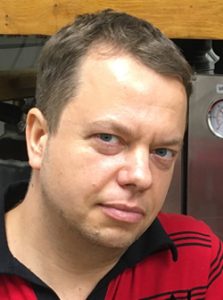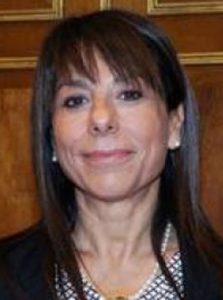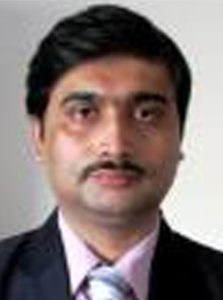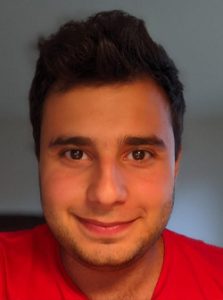Event Speakers
Awardees 2024
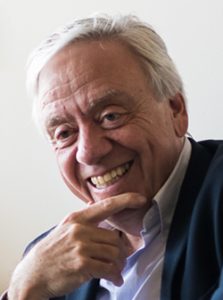
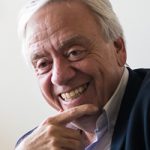
Michel Goldman
Institute for Interdisciplinary Innovation in healthcare, Université libre de Bruxelles, Brussels, Belgium
Blaise Pascal Medal in Medicine and Life Sciences | AL1
Michel Goldman, MD, PhD, is the Founding President of the Institute for Interdisciplinary Innovation in healthcare at the Université libre de Bruxelles. He currently serves as Editor-in-Chief of the journal Frontiers in Medicine and was the first Executive Director of the European Innovative Medicines Initiative from 2009 to 2014. He is a member of the Royal Academy of Medicine of Belgium and of the National Academy of Pharmacy in France.
Author of over 450 scientific publications in the fields of clinical medicine and immunology, he now works with Belgian and French economists on issues of innovation and access to medicines. He is the author of the book “La médecine d’après, leçons du Covid-19”, published by the Académie Royale de Belgique, and edited the collective work “Les vaccins, ce que tu dois savoir”.
Michel Goldman is a laureate of the Lucien Steinberg Prize (shared with Pr. Peter Piot, 1997), of the Quinquennial Prize of the Belgian National Fund of Scientific Research (2000), and of the Spinoza chair at the University of Amsterdam (2001). In 2007, he was awarded the degree of Doctor Honoris Causa of the Université of Lille. In 2024, Michel Goldman was the recipient of the Blaise Pascal Medal for Medicine and Life Sciences awarded by the European Academy of Sciences.
Blaise Pascal Medal in Medicine and Life Sciences

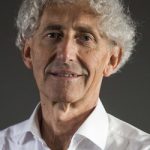
Alfio Quarteroni
Politecnico di Milano, Italy; EPFL, Lausanne, Switzerland
Blaise Pascal Medal in Mathematics | AL2
Alfio Quarteroni is Emeritus Professor of Numerical Analysis at the Politecnico of Milan (Italy) and Emeritus Professor at EPFL, Lausanne. He is the founder (and first director from 2002 until 2022) of MOX at Politecnico of Milan, and MATHICSE at EPFL, Lausanne (2010). He is co-founder (and President) of MOXOFF, a spin-off company at Politecnico of Milan (2010).
He is a member of the Italian Academy of Science (Accademia Nazionale dei Lincei), the European Academy of Sciences, the Academia Europaea, the Lisbon Academy of Science, and the Italian Academy of Engineering and Technology. He is the author of 25 books, editor of 12 books, author of more than 400 papers published in international Scientific Journals and Conference Proceedings, member of the editorial board of 25 International Journals and Editor in Chief of two book series published by Springer.
He has been an invited or plenary speaker in more than 400 International Conferences and Academic Departments, he has been invited speaker at ICM 2002 in Beijing and plenary speaker at ICM 2006 in Madrid. Among his awards and honours are the NASA Group Achievement Award for the pioneering work in Computational Fluid Dynamics in 1992, the Capo d’Orlando prize for science 2004, the Fanfullino d’oro 2006, the longlife Ghislieri prize 2013, the International Galileo Galilei prize for sciences 2015, The Euler lecture in 2017, the ECCOMAS Euler Medal 2022, the ICIAM Lagrange Prize 2023, the ECCOMAS Ritz-Galerkin medal 2024, the Blaise Pascal medal for Mathematics 2024 from the European Academy of Sciences.
He is the Recipient of two ERC Advanced Grants, Recipient of the Galileian Chair from the Scuola Normale Superiore, Pisa, Italy ,2001, doctor Honoris Causa in Naval Engineering from University of Trieste, Italy, 2003, SIAM Fellow (first row) since 2009, IACM (International Association of Computational Mechanics) Fellow since 2004. He has been a member of the Fields Medal Committee of 2022.
His research interests concern Mathematical Modelling, Numerical Analysis, Scientific Computing, Scientific Machine Learning, and Application to fluid mechanics, geophysics, medicine, and the improvement of sports performance. His research Group at EPFL has contributed to the preliminary design of Solar Impulse, the Swiss long-range experimental solar-powered aircraft project; his research group at EPFL has carried out the mathematical simulation for the optimisation of performances of the Alinghi yacht, the winner of two editions (2003 and 2007) of the America’s Cup. His ERC Team at Politecnico of Milan has developed the first integrated mathematical model for the simulation of the complete cardiac function.
Blaise Pascal Medal in Mathematics


Joachim Sauer
Institute für Chemie, Humboldt.Universität zu Berlin
Blaise Pascal Medal in Chemistry | AL3
Joachim Sauer is Senior Researcher at Humboldt University in Berlin where he was Professor of Theoretical Chemistry from 1993 – 2017. He has got the Dr. rer. nat. degree in Chemistry from Humboldt University in (East-)Berlin in 1974.
He is known for development and applications of quantum chemical methods in surface science, adsorption and catalysis. He has published more than 400 research papers, notably in the area of modeling the structure and reactivity of transition metal oxides, zeolites and metal-organic frameworks, and he has given 525 invited lectures.
Among other awards, he has received the Schrödinger medal of the World Association of Theoretical and Computational Chemists, the Francis Gault Lectureship of the European Catalysis Societies, and the ACS Award 2023 in Surface Chemistry. He is member of the German National Academy Leopoldina, Foreign Member of the Royal Society and International Honorary Member of the American Academy of Arts and Sciences.
Web-link: https://www.chemie.hu-berlin.de/de/forschung/quantenchemie/Group/js-1/js_cv
Blaise Pascal Medal in Chemistry


Luís Oliveira e Silva
Instituto de Plasmas e Fusão Nuclear, IST, Lisboa, Portugal
Blaise Pascal Medal in Physics | AL5
Luís O. Silva is Distinguished Professor and Professor of Physics at Instituto Superior Técnico, University of Lisbon, since 2010 (where he is also now President of the School Council), and a Visiting Professor in the Department of Physics at the University of Oxford since 2022. He obtained his degrees (Lic. 1992, PhD 1997 and Habilitation 2005) from IST, and was a post-doctoral researcher at the University of California Los Angeles from 1997 to 2001. His scientific contributions are focused in the in silico exploration of the interaction of intense beams of particles and lasers with plasmas, in laboratory and astrophysical scenarios. He has been awarded several national and international awards, including two ERC Advanced Grants, and election to Fellow of the American Physical Society, the European Physical Society, the European Academy of Sciences, and to Corresponding Member of the Lisbon Academy of Sciences.
Blaise Pascal Medal in Physics


Pete Smith
Institute of Biological & Environmental Sciences, University of Aberdeen, UK
Blaise Pascal Medal in Earth and Environmental Sciences | AL4
Pete Smith is Professor of Soils and Global Change at the Institute of Biological and Environmental Sciences at the University of Aberdeen (Scotland, UK) and Science Director of the Scottish Climate Change Centre of Expertise (ClimateXChange). His interests include climate change mitigation, soils, agriculture, food systems, ecosystem services modelling and nature-based solutions.
He is a Fellow of the Royal Society of Biology, a Fellow of the Institute of Soil Scientists, a Fellow of the Royal Society of Edinburgh, a Foreign Fellow of the Indian National Science Academy, a Fellow of the European Science Academy, and a Fellow of the Royal Society (London).
Blaise Pascal Medal in Earth and Environmental Sciences


Pol Spanos
Ryon Chair in Engineering, Rice University, Houston, Texas, USA
Blaise Pascal Medal in Engineering | AL7
Professor Spanos is a Caltech alumnus with a Ph.D degree in Applied Mechanics and with minor I in Applied Mathematics and minor II in Business Economics; and with an MS degree in Civil Engineering. Also, he holds a 5-year diploma in Mechanical Engineering and Engineering Sciences for NTU in Athens, Greece. His interests are in the area of dynamical systems with emphasis on probabilistic (risk and reliability), non-linear, and signal-processing aspects; and with applications to structural- , aerospace-, offshore- , bio-, and materials- engineering. He has supervised the MS theses of more than 75 students and the Ph.D. theses of more than 60 students. His research findings have been disseminated in more than 400 papers in archival journals, technical conferences, and industrial reports. He is Editor-in-Chief of the International Journal of Non-Linear Mechanics, and of the Journal of Probabilistic Engineering Mechanics. He is a Distinguished/ Honorary Member of both ASCE and ASME. He is a member of the academies NAE and AAAS (USA); and a corresponding/foreign member of NA/NAE of Hellas, Europe, Canada, China, India, and Russia. He is a Registered Professional Engineer (TX), and a Licensed CE/ME Engineer (GR) His work has been supported by NSF, DOE, ONR, AFOSR, NASA and by many industrial consortia. He has received numerous awards from NSF, ASCE, ASME, IASSAR, and Rice University (teaching prize). Since 1988, he holds the LB Ryon Endowed Chair in Engineering at Rice University in Houston, Texas.
Blaise Pascal Medal in Engineering
Speakers


Natividad Carpintero-Santamaría
Instituto de Fusión Nuclear “Guillermo Velarde” (IFN GV) – UPM, Madrid, Spain
Chemistry and Biochemistry | L22
Professor Doctor Natividad Carpintero Santamaría is currently senior researcher at the Instituto de Fusión Nuclear “Guillermo Velarde” (IFN GV) at Polyechnic University of Madrid. From 1982 until 2022 she was general secretary at the IFN GV.
She is a member of the Presidium of the European Academy of Science. She has represented the Spanish government at the International Atomic Energy Agency (IAEA), the Nuclear Energy Agency (NEA) and other international institutions and has given conferences and courses in over 40 countries around the world.
She authored the book The Atom Bomb: The Human Factor during the Second World War (Díaz de Santos, 2007) and co-edited, together with Professor Chair of Nuclear Physics Guillermo Velarde, the book Inertial Confinement Nuclear Fusion: A Historical Approach by its Pioneers (Foxwell & Davies, 2007) considered as recommended reading by the EUROfusion Consortium of the European Commission and included in the Freedom of Information Act (FOIA) of the Department of Justice of the United States to provide information on a democratic social basis. She has published several papers and chapters of books in prestigious academic publishers such as Springer, Cambridge University Press, Cambridge Scholars, Routledge, Elsevier, Lexington, Taylor and Francis, etc.
In 1991 she received the Alfonso XIII Prize of History of Applied Science awarded by the Spanish Royal Academy of Sciences. She has been granted the Cross of Aeronautical Merit (White distinction) and the Cross of Military Merit (White distinction).


Xinliang Feng
Max Planck Institute of Microstructure Physics, Technische Universität Dresden, Germany
Materials Sciences and Engineering | B - Intelligent Materials for Sustainable Technologies and Products | L9
Prof. Feng is a Director at the Max Planck Institute of Microstructure Physics and Head of the Chair of Molecular Functional Materials at Technische Universität Dresden. His current scientific interests include synthetic methodology for new-type polymers, organic and polymer synthesis, interfacial chemistry, supramolecular chemistry of π-conjugated system, bottom-up synthesis of carbon nanostructures and graphene nanoribbons, 2D polymers and supramolecular polymers, 2D carbon-rich conjugated polymers for opto-electronics and spintronics, electrochemical exfoliation of 2D crystals, graphene and 2D materials for energy storage and conversion, new energy devices and technologies. He published more than 700 research articles, attracting >100.000 citations with an H-index of 164 (Google Scholar).
He was awarded several prestigious prizes such as the IUPAC Prize for Young Chemists (2009), European Research Council (ERC) Starting Grant Award (2012), Journal of Materials Chemistry Lectureship Award (2013), ChemComm Emerging Investigator Lectureship (2014), Fellow of the Royal Society of Chemistry (FRSC, 2014), Highly Cited Researcher (Thomson Reuters, 2014-2021), Small Young Innovator Award (2017), Hamburg Science Award (2017), EU-40 Materials Prize (2018), ERC Consolidator Grant Award (2018). He is a member of the European Academy of Sciences (2019), member of the Academia Europaea (2019), and member of the German Academy of Science and Engineering (acatech, 2021). He is an Advisory Board Member for Advanced Materials, Chemical Science, Journal of Materials Chemistry A, ChemNanoMat, Energy Storage Materials, Small Methods, Chemistry -An Asian Journal, Trends in Chemistry, etc. He is Head of the ESF Young Research Group “Graphene Center Dresden”, Working Package Leader of WP Functional Foams & Coatings for European Commission’s pilot project “Graphene Flagship”, and spokesperson for the DFG Collaborative Research Center for the Chemistry of Synthetic 2D Materials (2020-).


Bing Joe Hwang
National Taiwan University of Science and Technology (Taiwan Tech)
Materials Sciences and Engineering | A - Materials and Engineering Towards Sustainable | L5
Professor Bing Joe Hwang received his Ph.D. in chemical engineering from the National Cheng Kung University in 1987. He is currently the Chair Professor in the Department of Chemical Engineering at the National Taiwan University of Science and Technology (Taiwan Tech). His research has spanned various subjects, from electrochemistry to spectroscopy, interfacial phenomena, materials science, and theoretical chemistry. He has established both experimental and computational strategies for developing electrochemical energy materials and understanding interfacial phenomena. His work has led to a better understanding of electrochemical reaction mechanisms and improved ability to discover the properties of potential new materials for batteries, fuel cells, and hydrogen production. He shows excellence in research activities with 550 peer-reviewed publications, 80 patents, 40621 times citations, and an H-index of 100.
He is also the Founder and Director of Sustainable Electrochemical Energy Development Center (Taiwan Tech), Adjunct Researcher of National Synchrotron Radiation Research, and the Associate Editor of the journal of ACS Sustainable Chemistry & Engineering. Professor Hwang has received many recognitions, including Clarivate Analytics Highly-cited Researcher (2022, 2023), Humboldt Research Award (2020), Fellow of the Royal Society of Chemistry (FRSC) (2018), Academician of Asian Pacific Academy of Materials (APAM) in 2017, Fellow of International Society of Electrochemistry (FISE) in 2014, Academician of the Academy of Sciences of Lisbon in 2011 etc. In addition, Professor Hwang served in essential positions in multiple research and academic societies, including the Founder and President of The Electrochemical Society of Taiwan, Coordinator of the Program of Chemical Engineering in the National Science and Technology Council (NSTC), President of the Chinese Association of Chemical Sensors and Technology in Taiwan, and President of The Society of Hydrogen and Fuel Cells of Taiwan.


Elvira Fortunato
NOVA School of Sciences and Technology, Lisbon, Portugal
Materials Sciences and Engineering | B - Intelligent Materials for Sustainable Technologies and Products | L11
Elvira Fortunato was born in Almada in 1964.
She has a degree in Physics and Materials Engineering (1987, NOVA FCT); a PhD in Materials Engineering: Microelectronics and Optoelectronics (1995, NOVA FCT).
Currently she is Professor at the Materials Science Department at NOVA FCT and from 2017 to 2022 she was Vice-Rector of NOVA University, where she has coordinated the research area. She was Director of the Associated Laboratory of the Institute of Nanomaterials, Nanofabrication and Nanomodelling from 1998 to 2022.
From 2015 to 2020 she was selected to be part of the first Group of Chief Scientific Advisors group of seven researchers in the European Commission Scientific Advice Mechanism (https://scientificadvice.eu/) based on scientific evidence.
Since 2010 she has been in the Chancellery of the Honorific Orders of Portugal, at the Presidency of the Republic.
In March 2022, she become Minister for Science, Technology and Higher Education from the Portuguese Government until April 2024.
In 2022, she was part of the group of 27 inspiring European Women, elected by the current French Presidency of the European Union.
In the same year she was selected as one of the 20 European inventors by ThinkYoung in a research and publicity project developed by the European Commission in partnership with Ericsson.
She is a pioneer in European research on transparent electronics using sustainable materials and environmentally friendly technologies. In 2008, at the 1st edition of the European Research Council ERC grants, she was awarded an Advanced Grant for the project INVISIBLE, considered in 2011 by the European Commission to be a success story. This year 2024, INVISIBLE project was again selected by ERC and considered as a scientific breakthrough during the ex-post per-review evaluation done by ERC (to be published before summer).
Following her target on sustainable electronics, she showed with her group the possibility of manufacturing the first paper transistor, starting a new field in the area of paper electronics. In 2018 she was awarded a second Advanced Grant for the project DIGISMART. Recently, and following on from the exploratory results of the DIGISMART, she obtained a Proof of Concept with the e-GREEN project: From forests to Green Electronics, focusing on exploring environmentally friendly and low-cost materials and technology exploration.
With over 900 scientific papers published (some highly cited from Web of Science), in the last few years she has been awarded more than 50 prizes and international distinctions for her work, of which we note the title of Grand Officer of the Order of Infante D. Henrique, bestowed by the President of the Republic in 2010, the Blaise Pascal Medal in 2016, the Czochralski prize in 2017, the Pessoa prize in 2020, the Horizon Impact prize by the European Commission in 2020 with the project INVISIBLE, the prize of the World Federation of Engineering Organizations: WFOE GREE AWARD Women in 2020, The Strait of Magellan Prize by the Chilean Government in 2020, the Innovation in Materials prize in 2021 granted by the FEMS and the Human Rights Prize granted by Parliament in 2021. In 2021 she was the winner of the ‘Portugal’s Women’s Leadership Award’, as part of the ‘Global Summit of Women’, organised by The GlobeWomen Research and Education Institute. In the same year she was awarded with the IUMRS-Frontier Materials Scientists Award by the Chinese Academy of Science and Technology, in the field of materials, in its first edition and also in 2021 she was awarded with the Gold Medal by the Portuguese Order of Engineers.
In 2023 she was honoured with the 2023 Career and Recognition Award by the Portuguese Materials Society. In 2024 she was elected the Trusted Personality of the year in the field of Scientific Research by Reader Digest for the fourth year running and the most Influential Women in Portugal (Revista Executiva) for the 9th consecutive year (since the first edition).
She has coordinated several national and international project, of which we note her pioneering activity at NOVA University in the field of equal opportunities through the SPEAR project, a European platform to support and implement plans for gender equality in higher education institutions.
She is an elected member of the Engineering Academy, the European Science Academy, the Lisbon Science Academy, and the Europaea Academy. She has been on the Luso-American Foundation for Development Board of Trustees since 2014 until 2022.


Plinio Innocenzi
University of Sassari, Italy
Chemistry and Biochemistry | L16
Plinio Innocenzi is full professor of Materials Science and Engineering at the University of Sassari and Director of the Laboratory of Materials Science and Nanotechnology. He studied physics at the University of Padova and did his postdoc at the University of Kyoto in Japan from 1993 to 1996. He has served from 2010 to 2018 as science counsellor at the Embassy of Italy in China. He has published more than 240 scientific articles on nanoscience and sol-gel and hybrid organic-inorganic chemistry. His research interests include nanomaterials for photonics and nanobiotechnologies synthesised via chemical routes. He has published several books dedicated to popularization of science.


Paul Lecoq
European Organization for Nuclear Research (CERN), Geneva, Switzerland
Physics | L26
Paul Lecoq has received his diploma as Engineer in Physics Instrumentation at the Ecole Polytechnique de Grenoble in 1972, under the leadership of Nobel Laureate Louis Néel. After two years of work at the Nuclear Physics laboratory of the University of Montreal, Canada, he got his PhD in Nuclear Physics in 1974. Since then, he has been working at CERN in 5 major international experiments on particle physics, one of them led by Nobel Laureate Samuel Ting. His action on detector instrumentation, and particularly on heavy inorganic scintillator materials has received a strong support from the Nobel Laureate Georges Charpak. He has been the technical coordinator of the electromagnetic calorimeter of the CMS experiment at CERN, which played an important role in the discovery of the Higgs boson.
Paul Lecoq is the founder of the CERN-based international Crystal Clear collaboration regrouping 31 institutes and companies worldwide contributing to the development of scintillator science. He has also created the SCINT conference series in 1991, which gathers every second year the international community working on fundamental aspects, production technologies and applications of scintillators.
Member of a number of advisory committees and of international Societies he has been the promoter in 2002 of the CERIMED initiative (European Center for Research Research in Medical Imaging, installed in Marseille) for networking physics and medicine in the field of medical imaging.
He has been elected in 2008 member of the European Academy of Sciences and in 2017 head of the Physics division of the Academy.
He has been awarded an ERC advanced grant in 2013 by the European Research Council. He has been elevated in 2015 in USA to the fellow grade at IEEE, the world’s largest technical professional organization for the advancement of technology. He has received in 2019 the IEEE NPSS Merit Award.
Since August 2019 he is CEO of the company Multiwave Metacrystal SA, based in Switzerland: https://metacrystal.ch
In 2020 he has got a position of Distinguished Professor at the Polytechnic University of Valencia (Spain).
In Feb. 2023 he has been nominated Dortor Honoris Causa of the Polytechnic University of Valencia (Spain).


Alexander Mathys
Institute of Food, Nutrition, and Health; ETH Zürich, Switzerland
Life and Food Sciences | L3
Prof. Dr.-Ing. Alexander Mathys is food technologist and received his doctoral degree in food processing in 2008. He is Professor in Sustainable Food Processing at ETH Zurich and Singapore-ETH Centre, where he is working on more efficiency and sustainability of value chains in food and feed. Dr. Mathys acts as President of the Swiss Academy of Sciences National Committee of IUFoST. He was Head of the Bioeconomy Department at German Institute of Food Technologies DIL in 2012-2015 and worked as expert in non-thermal preservation and sterilization technologies at the Nestlé Research Centre Lausanne in 2009-2012. Dr. Mathys is the author of more than 110 publications, 10 book chapters, and 13 patents. He is selected International Academy of Food Science and Technology (IAFoST) Fellow since 2024, ETH Zurich Dandelion Entrepreneurship Special Award Winner 2022, IFT International Food Security Award Winner 2020; Young Researcher of the 60th Meeting of Nobel Laureates 2010; Einstein Young Scholar 2010; and A.T. Kearney Scholar 2011/2012 at the Falling Walls conferences.


Chao-Jun Li
McGill University, Montreal, Canada
Chemistry and Biochemistry | L13
Prof. Chao-Jun Li is a Distinguished James McGill Chair at McGill University (Canada). He received his Ph.D. at McGill University (1992) and was an NSERC Postdoctoral Fellow at Stanford University (US). He was an Assistant (1994), Associate (1998), and Full Professor (2000) at Tulane University (US). Since 2003, he has been a Canada Research Chair (Tier I) in Green Chemistry and E. B. Eddy Chair Professor at McGill University. He also serves as the Co-Director for Quebec’s FQRNT Center for Green Chemistry and Catalysis since 2009. He was a pioneer in using water as a green solvent and a global leader in developing Green Chemistry for chemical synthesis. He was a highly cited researcher by Thomson Reuters/Clarivate Analytics (2014-2017). He received a US NSF’s CAREER Award (1997), US Presidential Green Chemistry Challenge Award (2001), 2010 Canadian Green Chemistry and Engineering Award, 2015 R. U. Lemieux Award and 2018 Alfred Bader Award of the Canadian Chemical Society, the 2020 Catalysis Award and the 2022 CIC Medal of the Chemical Institute of Canada, the 2021 Alexander von Humboldt Research Award, the 2002 JSPS Senior Fellow, and the 2018 Killam Research Fellow of the Canadian Council of Arts among others. Dr. Li was elected as a Fellow of the Royal Society of Canada (Academy of Sciences) (2012), the Royal Society of Chemistry (UK) (2007), the American Association for the Advancement of Science (AAAS) (2012), the Chemical Institute of Canada (2013), the American Chemical Society (ACS) (2015), the Chinese Chemical Society (2020), The World Academy of Sciences (TWAS) (2016) and the European Academy of Sciences (2020).
Website: https://www.cjlimcgill.ca/prof-chao-jun-li/


José Moura
LAQV. NOVA School of Sciences and Technology, Lisbon, Portugal
Chemistry and Biochemistry | L21
José J. G. Moura has a degree in Chemical Engineering, a Ph.D. degree in Chemistry and is Professor of Chemistry at the Department of Chemistry, School of Sciences and Technology, Universidade NOVA de Lisboa (FCT NOVA). For extended periods, he was Research Specialist at the University of Minnesota and Adjunct Professor at the University of Georgia, Athens (USA). José Moura served as President of the Chemistry Department and as President of the Scientific Council at FCT NOVA. He was Portuguese Delegate to COST and INTAS, a member of the Scientific Panel in the Calouste Gulbenkian Foundation and FCT/MCTES, NST (USA) Specialised Panel, and of several scientific editorial boards. In 2010, was elected President of the Society of Biological Inorganic Chemistry, for 2 years. José Moura is Director of the Campus Library, the Department of Documentation and Culture and coordinator of the FabLab (in duty) at FCT NOVA. He actively promotes culture/science interfaced activities and is curator of several multidisciplinary activities (STEAM).
José Moura has more than 600 publications. 425 publications are indexed at Scopus, where they collect 15,371 citations and originate an h-index of 66. He is also co-editor of 2 Books, of The Royal Society of Chemistry and Springer, and of 1 special issue of the Journal of Biological Inorganic Chemistry. Reflecting this prolific work, José Moura is an active participant in numerous international and national conferences as invited plenary and keynote speaker. He has been PI of several R&D Projects (26), participating also as a research member in several others (21). He has an extended experience in student and researchers supervision (25 Post-Doctoral fellows, 44 PhD Theses and also several Master and Undergraduate students). In 2006, he was elected Member of the Academia das Ciências de Lisboa and, in 2021, Fellow of the European Academy of Sciences (EURASC), having been awarded with several other Distinctions, Prizes and Honours, in particular, in 2022, with the Ferreira da Silva award from the Sociedade Portuguesa de Química.
José Moura’s research interests are focused in the role of Metals in Biology, having actively and notably contributed to the emergence and establishment of the Bioinorganic Chemistry in Portugal and internationally. His research efforts have been mainly devoted to the study of structure-function relationships in metalloproteins (with great emphasis on the metabolism of carbon, sulfur and nitrogen), mastering biochemical, spectroscopic (NMR, EPR and Mössbauer) and bioelectrochemical methodologies. Metalloproteins containing heme and non-heme iron, molybdenum, tungsten, nickel, copper, vanadium and cobalt have been at the centre of his attention, as well as, some model inorganic systems and biocatalytic mimetics.
Key-words: Bioinorganic Chemistry; Inorganic Biochemistry; Spectroscopy (NMR, EPR and Mössbauer); Biophysics; Biocatalysis; Energy Bioconversion (Hydrogen); Protein-Protein interactions; Science Outreaching; STEAM
ORCID JM 0000-0002-4726-2388
Researcher ID D-6426-2013
jose.moura@fct.unl.pt|
http://sites.fct.unl.pt/biologicalchemistryatfctunl
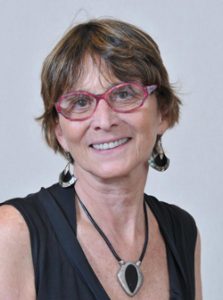

Helena Nader
Universidade Federal de São Paulo (Unifesp), Brazil
Life and Food Sciences | L1
Helena B. Nader is Professor Emeritus at the Escola Paulista de Medicina of the Federal University of São Paulo (Unifesp).
She obtained her PhD at Unifesp and post-doctoral training as a Fogarty (NIH) fellow at the University of Southern California.
Since 1985, she is a 1A (highest level) research fellow of the National Research Council for the Scientific and Technological Development (CNPq). She serves as president of the Brazilian Academy of Sciences (ABC), co-chair of the Inter-American Network of Academies of Sciences (IANAS), vice-president for the Latin America and the Caribbean of The World Academy of Sciences (TWAS), vice-president of the Alliance of National and International Science Organizations for the Belt and Road Regions (ANSO), Governing Board member of the International Science Council (ISC), Advisory Committee member of the InterAcademy Partnership (IAP), and Strategic Committee member of the Science Panel for the Amazon (SPA). In 2024 she chairs the Science20, which is the Engagement Group for S&T of the G20. She is member of the ABC, TWAS, and the Latin America Academy of Sciences (ACAL). Former president of the Brazilian Society of Biochemistry and Molecular Biology, she is honorary president, former vice-president and former president of the Brazilian Society for the Advancement of Science (SBPC).
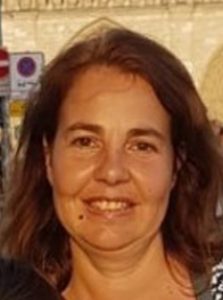

Ana Nunes
NOVA School of Sciences and Technology, Lisbon, Portugal
Chemistry and Biochemistry | L19
Ana V.M. Nunes completed her PhD in Chemical Reaction Engineering in 2008 by FCT-NOVA focusing on high-pressure technologies, particularly extraction and reaction processes. From 2009 to 2011, she worked as a project manager in the field of drug delivery, specifically formulation and micronization, at IBET. In 2011, Ana V.M. Nunes was awarded a post-doc grant and started her research on the field of CO2 utilization as a carbon feedstock in the manufacture of valuable products. In 2013, she founded with two University colleagues, Zeyton Nutraceuticals, a technology-based start-up to produce natural extracts from olive oil by-products. The technology is based on patents granted in the USA, Europe and other countries. Since 2015, she is an Assistant Researcher at LAQV-REQUIMTE. She was granted Principal Investigator of several FCT Research Projects, supervised MSc and PhD students, and has also relevant pedagogical experience, mainly through a regular collaboration with teaching at the Chemistry Department of FCT/NOVA.


João Rocha
Universidade de Aveiro, Portugal
Chemistry and Biochemistry | L17
João Rocha, a Full Professor of Chemistry, served as the Director of the University of Aveiro Institute of Materials-CICECO from 2002 to 2021. He earned his Ph.D. in Chemistry in 1990 and completed a post-doc in199, both at the University of Cambridge, UK.
He has received several prestigious honors, including Officer of the Chemistry Division of the European Academy of Sciences-EURASC (2014), member of the Académie Royal de Belgique des Science, des Lettres et des Beaux-Arts (2022), and of the Lisbon Academy of Sciences (2006), Fellow of the Royal Society of Chemistry (2016), and advisory member to the Prime Minister of Portugal (2012-2014). He has also received awards from the Portuguese, Spanish and French Chemical Societies. Additionally, he has served as coordinator of the ERC Consolidator Grants panel PE11.
Rocha has published about 550 SCI papers and 5 patents, that received (GS) over 30,000 citations (h 82). His work has significantly impacted various domains, including materials science and solid-state NMR spectroscopy. Notably, he has pioneered the creation of new materials akin to zeolites and the development of luminescent lanthanide-bearing Metal Organic Frameworks.
Rocha has contributed substantially to the academic community, holding various editorial and advisory roles, and nurturing future generations of scientists through mentoring and teaching.


Peter Roesky
Karlsruhe Institute of Technology, Germany
Chemistry and Biochemistry | L14
Peter W. Roesky obtained his doctoral degree from TU Munich in 1994. After postdoctoral work at Northwestern University, USA, he completed his habilitation at the University of Karlsruhe in 1999. He was appointed a full professor at the FU in 2001. In 2008, he became a full Professor at the Karlsruhe Institute of Technology (KIT). From 2013 to 2015, he served as Dean of the Faculty of Chemistry and Biosciences at KIT. His current research interests are synthetic inorganic and organometallic chemistry of s-block metals, silicon, phosphorus, gold, and lanthanides. In 1999, Prof. Roesky received a Heisenberg scholarship of the German Research Foundation, and in 2000 a Karl-Winnacker scholarship. Since 2014, he is a fellow of the Royal Society of Chemistry and since 2020 a fellow of the European Academy of Science (EurAsc). In 2019/20, he received a JSPS Invitational Fellowships for Research in Japan, in 2020 a Reinhart Koselleck Project of the German Research Foundation, and in 2022 the Frank Spedding Award for Research in Rare Earth Science. He is also Henriette Herz-Scout of the Alexander von Humboldt-Foundation.

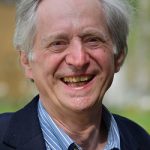
Peter Sadler
University of Warwick, Coventry, UK
Chemistry and Biochemistry | L20
Peter Sadler obtained his BA, MA and DPhil at the University of Oxford. Subsequently he was a Medical Research Council Research Fellow at the University of Cambridge and National Institute of Medical Research. From 1973-96 he was Lecturer, Reader and Professor at Birkbeck College, University of London, and from 1996-2007 Crum Brown Chair of Chemistry at the University of Edinburgh. In 2007 he took up a Chair in Chemistry at the University of Warwick as Head of Department, where he is now a Professor.
He is a Fellow of the European Academy of Sciences, the Royal Society of Chemistry, the Royal Society of Edinburgh, and the Royal Society of London, and an EPSRC RISE Fellow (Recognising Inspirational Scientists and Engineers). He is also an Honorary Fellow of the Chemical Research Society of India, and the Chinese Chemical Society.
He was awarded the Royal Society Davy Medal in 2022, for pioneering the research field of medicinal inorganic chemistry, “Metals in Medicine”, and the design of new metallodrugs with novel mechanisms of action. His team were awarded a 2022 Royal Society of Chemistry Dalton Division Horizon Prize.
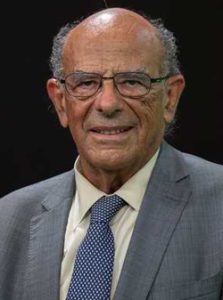

Filipe D. Santos
Centre for Ecology, Evolution and Environmental Changes, CHANGE—Global Change and Sustainability Institute, University of Lisbon, Portugal
Earth and Environmental Sciences | L24
Filipe Duarte Santos holds a M.Sc. in Geophysics by the University of Lisbon and a Ph.D. in Theoretical Physics by the University of London. Full professor of Physics and Environmental Sciences at the University of Lisbon and Director of the PhD program on Climate Change and Sustainable Development Policies – University of Lisbon, New University of Lisbon and University of East Anglia. Visiting professor since 1980 at several universities in the United States, including the University of Wisconsin, Duke University, the University of North Carolina, Stanford University, Harvard University, and at European Universities. Member of the Environment Steering Panel of EASAC (European Academies Science Advisory Council). Review Editor for the 5th Assessment Report of the IPCC WG II. President of the Portuguese Council on the Environment and Sustainable Development since 2017. His present area of research is climate change and sustainability. He has published more than 150 papers in SCI-indexed scientific journals in physics, climate change and sustainability and various books. His most recent book is: Time, Progress, Growth and Technology. How Humans and the Earth are Responding, 2021, Springer.
Orcid: https://orcid.org/0000-0001-7316-1479


Virender K. Sharma
University of Copenhagen, Department of Plant and Environmental Sciences, Denmark
Earth and Environmental Sciences | L25
Dr. Virender K. Sharma received his Ph.D. from Rosenstiel School of Marine and Atmospheric Science (RSMAS), University of Miami in 1989. He is currently a Professor at the Department of Environmental and Occupational Health, School of Public Health (SPH), Texas A&M University. He is also serving as the Director of the Environment and Sustainability Program at SPH. Dr. Sharma has made exceptional contributions in the field concerning the occurrence and remediation of toxins, antibiotics, antibiotics resistance bacteria and genes, nanoparticles, and microplastics/nanoplastics to address real-world challenges of water, energy, food sustainability and public health The mission of Dr. Sharma is “Saving Lives even One Life”. Dr. Sharma has made seminal contributions in the areas of chemistry and environmental applications of ferrate. Ferrate is an earth-abundant iron-based molecule, in which iron is in the plus 6-oxidation state (FeVIO42-), i.e., it is depleted of its electrons, and hence can serve as an advanced material to perform as an efficient surface disinfectant in hospital settings and as a water treatment oxidant. Ferrate has demonstrated multiple roles in performing disinfection, coagulation, and oxidation in various applications. A wide range of recalcitrant pollutants in water can be degraded by “Activated Ferrate” (FeVO43- and (FeIVO44- or FeIVO32-)) in seconds, which would otherwise take several minutes to hours by ferrate without activation. Importantly, he has demonstrated techniques that work at high, and even enhanced, efficiency in water containing commonly occurring natural organic matter that often inhibits the effectiveness of oxidative processes in removing micropollutants. Dr. Sharma has published > 460 peer-reviewed journal publications. Dr. Sharma has been recognized as Highly Cited Researcher (Top 1 %) by Clarivate (Web of Science). Dr. Sharma’s research has high impact (Google Scholar citations: >43,500; H-Index 99). He is Fellow of AAAS, ACS, EurASc, and RSC and received many international awards.
More information on Dr. Sharma at https://public-health.tamu.edu/directory/sharma.html


José María De Teresa
Instituto de Nanociencia y Materiales de Aragón (INMA), CSIC-Univ. de Zaragoza, Spain
Materials Sciences and Engineering | B - Intelligent Materials for Sustainable Technologies and Products | L12
Prof. José María De Teresa leads the group of Nanofabrication and Advanced Microscopies (Nanomidas) at the Instituto de Nanociencia y Materiales de Aragón (INMA, CSIC-Universidad of Zaragoza) in Spain. He is the coordinator of the Spanish network on Nanolithography (Nanolito) and the FIB-SEM area in the Spanish National facility for Advanced Microscopies. He is the Chair of the Condensed Matter Division Board in the European Physical Society. His main research interests are nanofabrication with focused electron and ion beams, magnetic nanostructures, nano-superconductivity and quantum technologies. He has contributed to more than 230 research articles (h factor=52) and given more than 100 invited conferences, being the supervisor of 18 PhD thesis (5 of them in progress). Some distinctions obtained are: Fellow of the American Physical Society (2021), Fellow of the European Physical Society (2023) and Fellow of the European Academy of Sciences (2024).
WEBLINK: https://nanofab-deteresa.com/
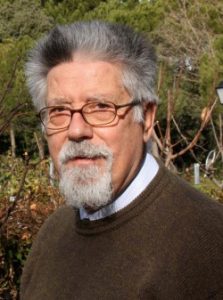
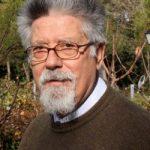
Manuel García Velarde
Instituto Pluridisciplinar, Universidad Complutense, 28040-Madrid, Spain
Physics | L27
Manuel G. VELARDE [born in Almeria, Spain (Sept. 14-9-41)]. Emeritus Prof. (Instituto Pluridisciplinar, U. Complutense Madrid) and STEAM Honorific Prof. (U. Europea Madrid). Doctor Physics (UCM-1968, UL Brussels-1970); Doctor “Honoris Causa” (Aix-Marseille-Provence-1994, Saratov-2010, Almeria-2019).
Research: Hydrodynamic instabilities in a diversity of fluids and fluid configurations; interfacial phenomena (self-propulsion of drops, wetting and spreading dynamics, patterns, waves, solitons); internal waves in straits, ocean and atmosphere; reaction-diffusion and lattice dynamics systems (patterns, waves, solitons & chaos, and synchronization processes); laser dynamics (Q-switch laser model with saturable absorber); cerebellar dynamics models; legs and brain models and dynamic GPS for (hexapod and/or roving) robots; soliton-assisted, ballistic, electron transport (electron surfing) theory for anharmonic crystals; field effect transistor invented (SFET, UK Patent GB 2533105, 2020) etc. Most results gathered in six coauthored research frontier monographs [Wiley-VCH, Springer (2), CRC-Taylor & Francis (2), Chapman & Hall].
Service to the profession: Committee “Liquids” (EPS,1982-94); IUPAP Commission C3 “Statistical Physics” (1987-93); NATO Panel “Chaos, Order and Patterns: Aspects of Nonlinearity” (1990-93); ESA Microgravity Advisory Committee (1994-97); European Low Gravity Research Association (President, 1997-99); International Center for Mechanical Sciences-CISM (Rector, Udine, 2002-4); European Science Foundation-Space Science Committee (ESF-ESSC, 2006-2009); LABEX Jury (President, France, 2010-11), etc.
Membership: Academia Europaea; EURASC.
Medals: Rammal-SFP (France, 1996); Dupont Prize (Spain, 2003); Ordre N. Merite (France, 2013); Blaise Pascal-EURASC (2015); etc.
Festschrifts: (60th birthday) Int. J. Bifurcation Chaos 12 (2002) 2305-2653; (70th birthday) Book “Without Bounds: A Scientific Canvas of Nonlinearity and Complex Dynamics” (Springer, 801 pp, 2013), and Adv. Colloid Interface Sci. 206 (2014) 1-454.
https://www.ucm.es/ip-1/fluidos
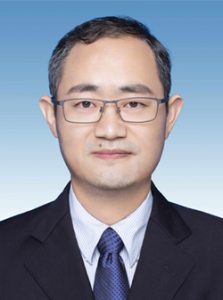

Zhihua Wang
Zhejiang University, State Key Laboratory of Clean Energy Utilization, China
Materials Sciences and Engineering | A - Materials and Engineering Towards Sustainable Energy | L6
Prof. Zhihua Wang is a Qiushi Distinguished Professor at the College of Energy Engineering at Zhejiang University. He was successfully awarded the Distinguished Young Scholars Fund (2021) and Excellent Youth Fund (2014) from the National Natural Science Foundation of China. In the year of 2005, he obtained his Ph.D. degree from Zhejiang University majoring in Engineering Thermophysics. His doctoral dissertation was nominated for National Excellent Doctoral Dissertation. He is currently the deputy director of the State Key Laboratory of Clean Energy Utilization. His research interest mainly focused on clean and efficient combustion of fossil and zero-carbon fuels, laser diagnostic, and combustion emission control. He has led more than 20 research projects from the National Natural Science Foundation, the National Basic Research Program of China, and the Key R&D Program Projects of China. He has co-authored more than 300 papers in peer-reviewed journals with a total citation of 12,000+ times, H Index 56 from Google Scholar. He has published one English monograph with Springer Publisher, two Chinese Monographs with Chinese Science Press, and Chemical Engineering Press. He has obtained the Second prize National Science and Technology Progress Award of China, the National Science and Technology Innovation Team Award, one Zhejiang Provincial Technological Invention Second Prize Award, and holdings more than 20 patents, including one Zhejiang Provincial Gold Patent.
Website: https://person.zju.edu.cn/en/wangzh
Google Scholar: https://scholar.google.com.hk/citations?hl=zh-CN&user=s7w_MhkAAAAJ


Zschech Ehrenfried
Brandenburg University of Technology CottbusSenftenberg, Germany
Materials Sciences and Engineering | B - Intelligent Materials for Sustainable Technologies and Products | L8
Ehrenfried Zschech is a consultant with hands-on experience in the fields of advanced materials, nanotechnology and microelectronics as well as process control and quality assessment. He holds honorary professorships for Nanomaterials at Brandenburg University of Technology Cottbus-Senftenberg and for Nanoanalysis at Dresden University of Technology. His activities include high-resolution X-ray imaging and the development of customized solutions for a broad range of applications including package failure analysis, metrology and inspection in microelectronics. Ehrenfried Zschech received his Dr. rer. nat. degree from Dresden University of Technology. He had several management positions at Airbus, at Advanced Micro Devices, at Fraunhofer and at the start-up deepXscan. Ehrenfried Zschech is Member of the European Academy of Science (EurASc) and Member of the of the German National Academy of Science and Engineering (ACATECH). In 2019, he was awarded with the FEMS European Materials Gold Medal.
Speakers - Industry


Yu Wang
Farasis Energy (Hayward, USA; Frickenhausen, Europe; Ganzhou and Zhenjiang, China)
Industry Session | L30
Dr. Yu Wang is Chairman and President of Farasis Energy (Ganzhou) Co. Ltd., which is a leading developer and manufacturer of advanced Li-ion cells, modules and pack systems for electric vehicle and energy storage applications. Before founding Farasis Energy in 2002 in California, USA, he was Chief Cell Designer of the corporation and Director of R&D Dept. at PolyStor Corporation in California, USA. Prior to Polystor, he was a Scientist at NEC Moli Energy (Canada) Ltd. in Vancouver, Canada. Dr. Wang earned his Ph.D. in 1994 from University of Lisbon and did his post-doc. in the University of British Columbia, Vancouver, Canada.
Speakers - Startups


Eric Fernandes
Nova Friburgo, Brazil
Startups Session | L31
I am Eric Fernandes, an entrepreneur and publicist with a degree from PUC at Rio de Janeiro.
Passionate about nature and outdoor activities, I am dedicated to finding solutions for sustainable development. Founder of RECICLOTRON, I developed the startup with support from the SUSTENTA-VIDA Extension Program and the Innovation Agency of the Fluminense Federal University. Our digital technology connects those who want to recycle with those who recycle, promoting the correct disposal of e-waste and conscious consumption. Our multidisciplinary team has expertise in sustainability, systems, IoT, waste management, design, environmental education, communication and marketing. We transform e-waste into benefits for users to take advantage of offers from eco-friendly partners. We refurbish products to promote the work of social institutions through art, environmental education and digital inclusion. We transform waste into opportunities for users and partners, leveraging the production chain and facilitating the conversion to the green economy.

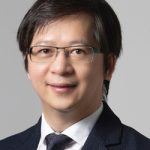
Pui-In Mak
Digifluidic State-Key Laboratory of Analog and Mixed-Signal VLSI University of Macau, Macau, China
Startups Session | L35
Elvis, Pui-In Mak received the B.Sc. and Ph.D. degrees from the University of Macau (UM), Macao, China, in 2003 and 2006, respectively. He is currently Professor at UM Faculty of Science and Technology – ECE, and Director at the UM State-Key Laboratory of Analog and Mixed-Signal VLSI, and Deputy Director (Research) at the UM Institute of Microelectronics. His research interests are on analog and radio-frequency (RF) circuits and systems for wireless and multidisciplinary innovations.
His team reported 39 state-of-the-art chips at the 2011-2024 IEEE International Solid-State Circuits Conference (ISSCC). He is currently Editor-in-Chief of the IEEE Solid-State Circuits Letters. He was the TPC Member of ISSCC, A-SSCC and ESSCIRC. He was the Distinguished Lecturer of the IEEE Circuits and Systems and Solid-State Circuits Societies. He is an Overseas Expert of the Chinese Academy of Sciences, Fellow of the IEEE, IET and UK Royal Society of Chemistry (RSC). He received the Tencent Xplorer Prize in 2022, and recognized in 2023 as one of the Top Contributing Authors of ISSCC in its 70 years of history. He is a foreign Corresponding Member of the Academy of Sciences of Lisbon, Portugal, since 2024.


João Mano
METATISSUE, Portugal
Startups Session | L34
João F. Mano is a Full Professor at the Chemistry Department of University of Aveiro, and vice- director of the Associate Laboratory CICECO – Aveiro Institute of Materials, where he is leading the COMPASS Research Group (https://compass.web.ua.pt). His research focuses on the application of advanced biomaterials and cells to advance multidisciplinary concepts in the field of regenerative and personalized medicine. Specifically, he utilizes biomimetic and nano/micro- technology approaches to develop polymer-based biomaterials and surfaces for the creation of biomedical devices with enhanced structural and multi-functional properties. He also engineers microenvironments to regulate cell behavior and organization, with the goal of clinically applying these technologies in advanced therapies and drug screening, or in the bioengineering of disease models. He serves as the Editor-in-Chief of Materials Today Bio (Elsevier). He has been coordinating multiple research projects, including 2 Advanced Grants and 3 Proof-of-Concept Grants from the European Research Council. He received different honours, including two honoris causa doctorates (Univ. of Lorraine and Univ. Utrecht), the George Winter Award 2020 from the ESB and he was elected fellow FEurASc, FBSE and FAIMBE.


Diego De Miguel
Certest, Spain (Medicine and life sciences)
Startups Session | L33
Dr. Diego de Miguel is an expert in lipid nanoparticles and cellular biology, with a strong background in immunology, cell death and inflammatory pathways. At Certest Pharma, he leads the discovery of next generation LNP formulations to enable novel targeted therapeutic applications.
Diego de Miguel obtained his Bachelor’s degree in Biochemistry at the University of Zaragoza in 2009, followed by a MsC in Cellular Biology in 2010, obtaining his PhD in 2015. During his PhD, Dr. de Miguel mainly focused on the use of lipid nanoparticles as platform for delivering death ligands and chemotherapeutic drugs to cancer and immune cells. During this period, he engineered lipid nanoparticles by functionalizing them with targeting motifs and optimized their lipid composition to enhance their efficacy.
After his PhD, Dr. de Miguel joined Prof. Henning Walczak’s laboratory at the UCL Cancer Institute, where he focused on the molecular study of different pro-inflammatory signalling pathways, especially Apo2L/TRAIL, TNF and TLR3. After 4 years of post-doctoral experience abroad, Dr. de Miguel returned to Spain, seeking to apply his expertise in cell death and inflammation to more translational models of immunity, deepening the understanding of the inflammatory and cytotoxic mechanisms of NK cells and T cells.
In 2021, Dr. de Miguel joined Certest as Manager of the LNP Formulation Department to embark upon the development of mRNA vaccines using lipid nanoparticles (LNP). In this role, he oversees exploring new LNP formulations incorporating Certest biomaterials, aiming at optimizing current commercial standards, as well as developing successful lyophilization processes for lipid nanoparticles which remove the need for freezing temperatures for the storage and shipping of LNP-based therapeutics. Moreover, Dr. de Miguel is in charge of designing new formulations with targeting capabilities towards specific tissues or cell types to enable a more precise delivery of the nucleic acid payloads.


Henrique Pombeiro
Watt-IS, Portugal (Engineering)
Startups Session | L32
Henrique Pombeiro is a co-founder and Chief Scientific Officer (CSO) of Watt-IS, a technological company focused in delivering high-value services based in advanced AI/Machine learning algorithms that foster energy efficiency. At Watt-IS, Henrique has been responsible for the overall scientific development and co-managing the company’s operations. Henrique has a MSc in Environmental Engineering from Instituto Superior Técnico (IST), University of Lisbon, and a PhD in Sustainable Energy Systems from that university within the MIT Portugal Program, EIT InnoEnergy PhD School and Fulbright Program. His academic pathway comprises a 6-month research period at the Massachusetts Institute of Technology, in Boston, MA, and various courses in renowned European universities. Henrique has several publications in ISI peer-reviewed journals and proceedings of international conferences, as well as been invited to several communications and panel discussions in the energy field and has been supervising and served as jury in MSc Theses within IST. Henrique was a founding member and board member of the Future Energy Leaders program, a group of young professionals in the energy field that foster energy discussion within the various ranks in the energy sector.
Posters Presenters


Diogo Pinto
CEGOT, Faculty of Arts and Humanities of University of Porto, Portugal
Poster Session | P1
Diogo Miguel Pinto holds a Bachelor’s in Geography and a Master’s in Risks, Cities, and Spatial Planning from the University of Porto, where he specialized in Urban Policies and Spatial Planning. He also holds a postgraduate in Geographic Information Systems and Civil Protection Law. His professional experience spans roles such as Senior Technician in the Geographic Information Sector at the Municipality of Peso da Régua and Geography Technician at MPT – Mobility and Territory Planning, Ltd. He has been a researcher on the AVODIS project, focusing on rural fire prevention, and completed an internship with the Agency for the Integrated Management of Rural Fires (AGIF). He is a collaborating researcher at the Center for Geography Studies and Spatial Planning (CEGOT), a former member of the External Evaluation Committee for A3ES, and since 2023, a Young Auditor of National Defense at the National Defense Institute.


Esma Ismailova
IMT/Mines St. Etienne, Department of Bioelectronics, Gardanne, France
Poster Session | P2
Esma Ismailova is an Associate Professor in the Bioelectronics department (BEL) at the Ecole Nationale Supérieure des Mines de Saint-Étienne, in France. She completed her PhD in Chemistry and Physics at the University of Strasbourg, working on the synthesis of chemically amplified photoresists used in microelectronic circuits’ fabrication, sponsored by STMicroelectronics in France. She then joined the Laboratory for Organic Electronics at Cornell University, USA as a postdoctoral researcher developing conducting polymer-based devices at the interface between biology and electronics. Since 2012, her research interest focuses on the design and fabrication of novel organic electronic devices for healthcare. In 2015, she started the Bioelectronic textiles research group at BEL, and she is one of the first organizers of Electronic Textiles Symposia for the Materials Research Society in USA (2016, 2018, 2019) and Europe (2017).


Ana Rovisco
CENIMAT/ /i3N, Depart. of Materials Science, NOVA FCT
Poster Session | P3
Ana Rovisco is currently an assistant researcher at CENIMAT, where she has been a researcher since 2013. She completed her PhD in Nanotechnologies and Nanosciences in December 2019 at NOVA School of Science and Technology, NOVA University Lisbon (Department of Materials Science and i3N/CENIMAT), and earned her Integrated Master’s in Physics Engineering in December 2012 from the same university (Department of Physics). Since 2014, she has also served as a lab assistant for several courses related to nanofabrication and materials characterization at the Department of Materials Science. She is the (co)author of 17 peer-reviewed papers, 3 book chapters, and 2 conference papers (h-index = 13, as of August 2024). Her work primarily focuses on the synthesis (via solution processes), characterization (particularly electrical characterization inside SEM), and application (e.g., FETs, energy harvesters, and photocatalysis) of oxide nanostructures (mainly zinc-tin oxide, ZTO).


Brij Mohan
CQE, IST, ULisboa
Poster Session | P5
Dr. Brij Briz Mohan has been a researcher at Instituto Superior Técnico, Universidade de Lisboa, Portugal, since July 2022. He holds the position of Group Leader at the Institute of Advanced Materials, IAAM, Ulrika 590 53, Sweden, as an Honorary Adjunct since February 2024. Dr. Briz is also an Editorial Board Member for BMC Chemistry, BMC Cancer, and Discover Materials Journals and a Portugues Electrochemical Society member. He obtained his Ph.D. from Kurukshetra University, Kurukshetra, India, in December 2018 and worked as a postdoctoral research associate at the School of Sciences, Harbin Institute of Technology, Shenzhen, China, from November 2019 to December 2021.
His research focuses on designing new advanced materials such as MOFs, COFs, HOFs, and nanomaterials for ecological and energy applications. Notably, Dr. Briz has been recognized among Stanford's Top 2% most highly cited scientists in 2024 and has published numerous (More than 80) articles in refereed journals such as Advanced Functional Materials, Advanced Materials, Coordination Chemistry Reviews, Desalination, ACS Applied Materials & Interfaces, Journal of Hazardous Materials, Science of The Total Environment, Trends in Analytical Chemistry, Separation and Purification Technology, and Biosensors and Bioelectronics. These publications include 45 as first authors/corresponding authors, including 28 SCI Q1, and sole authorship of 1 SCI Q1 article, along with conference papers, 7 book chapters, and more than 10 international invited talks.


Anup Paul
CQE, IST, ULisboa
Poster Session | P7
Anup Paul obtained his Ph.D. in 2012 from North-Eastern Hill University (NEHU), Shillong, India. In 2013, he joined the Instituto Superior Técnico in Lisbon, Portugal, as an FCT postdoctoral fellow under the supervision of Prof. Armando J. L. Pombeiro. He is currently an assistant researcher at the same institution. His research centers on the rational design and synthesis of metal–organic frameworks (MOFs) and coordination polymers (CPs) for applications in heterogeneous catalysis, wastewater treatment, and as functional materials for energy storage and conversion reactions.
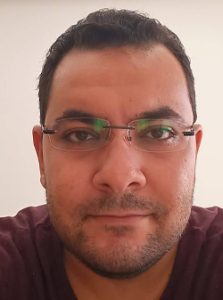
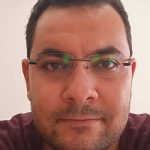
Abdallah G. Mahmoud
CQE, IST, Lisboa
Poster Session | P8
Dr. Abdallah Mahmoud is a postdoctoral researcher at the Associated Laboratory for Green Chemistry, Faculty of Science and Technology, Universidade Nova de Lisboa. He earned his PhD in Chemistry in 2019 from the Centre for Structural Chemistry at Instituto Superior Técnico, University of Lisbon, with a specialization in coordination chemistry and homogeneous catalysis. His current research focuses on the synthesis of organometallic compounds, the development of homogeneous and supported catalysis in aqueous media, the design of metal-organic framework-mediated structures, and creation of carbon-confined transition metal nanocomposites for applications in energy production and storage


Martin Prechtl
CQE, IST, Lisboa
Poster Session | P9
Martin Prechtl works at the Centro de Química Estrutural (CQE) at the Instituto Superior Técnico of the University of Lisbon (IST-UL, Portugal). There he completed the examination for the Portuguese Habilitation in 2021 and received the “Agregação” for Chemistry (Título do Agregado). Previously he has been already an Associated Researcher at the CQE-IST-UL since 2017. Moreover, he acted as a Professor of Chemistry at Roskilde University (2018-2020, Denmark). And he has been working as Independent Group Leader at the University of Cologne (Germany) from 2010 to 2020, where he obtained the German Habilitation in 2015 and he holds the Venia Legendi in Inorganic Chemistry (“Privatdozent”). From 2007 to 2010 he worked as Humboldtian postdoctoral fellow at the Universidade Federal do Rio Grande do Sul (Porto Alegre, Brazil) and at the HU Berlin, Germany, on nanoparticle catalysis in multiphase systems towards selective hydrogenation reactions. In 2007, he received his PhD degree from RWTH Aachen for his studies on activation of small molecules and selective (de)hydrogenation reactions in multiphase systems with molecular catalysts at the Max-Planck-Institut für Kohlenforschung in Mülheim/Ruhr, Germany. And, from 1999 to 2004 he studied chemistry and food chemistry at the University of Wuppertal (Germany) and performed research at the University of São Paulo (2002-2003, Brazil) as DAAD-fellow.
Based on his achievements about C1-molecule he works on the activation for the conversion of C1- molecules like formaldehyde, formic acid, MeOH and CO2. In addition he works in the field of homogeneous and nanocatalysis towards biomimetic catalytic systems for the realisation of sustainable processes in the field of green chemistry with a a major interest in selective hydrogenation and dehydrogenation reactions including tandem reactions.
He gave numerous oral presentations (>140) at major (inter)national conferences and at prestigious research institutes and published >80 articles and book chapters and filed, respectively hold two patents. Since 2010 he has been the first supervisor of 5 PhD, 14 Master, 5 Bachelor and 4 Diploma theses and acted also as examiner for these candidates. In addition, he acted as external examiner for PhD defenses at other universities (EPFL, Aarhus University, DTU). And he hosted also postdocs and guest scientists/professors from several countries funded with prestigious fellowships (i.e. Fulbright Foundation, Humboldt Foundation). And he has been coordinating research projects with a total funding volume >2.7M€. Since 2014 he has been acting also as editor, i. E. for Elsevier, MDPI, RSC, Wiley-VCH on topics about catalysis and sustainability. He received several awards and titles, among those the NRW Scientist Returnee Award 2009 (1.25M€), the Ernst-Haage-Prize 2014 (Max-Planck Society, Category 1: Outstanding national achievements; two patents granted), FRSC (2016) and he is Humboldtian since 2007. More information can be found at: http://www.h2.bio/


Sónia Carabineiro
Centro de Química Estrutural, Inst. Molecular Sciences, IST - UL | LAQV-REQUIMTE, NOVA FCT - UNL, Portugal
Poster Session | P10
Sónia Carabineiro graduated in Applied Chemistry at the New University of Lisbon, Portugal and obtained her Ph.D. degree in Chemical Engineering (Catalysis) in 2001 at the same University.
She was Post Doctoral Researcher from 2001 to 2003 at Leiden University, The Netherlands and from 2004 to 2007 at the University of Lisbon, Portugal.
From 2007 to 2013 she was Assistant Researcher at the University of Porto, Portugal, and Principal Researcher from 2013 to 2018.
In 2019 she was Invited (Visiting) Professor in the Wuhan Textile University, China and Integrated Researcher at the University of Lisbon. She obtained Habilitation in Chemistry at the same University.
In 2020 she became an Assistant Professor at the New University of Lisbon.
She is (co-)author more than 25 chapters in books, more than 230 articles in international scientific journals, more than 220 communications to national and international conferences, and more than 20 invited talks. She is co-inventor of 1 worldwide patent, evaluator of several international project proposals (including European Research Council grants). She has more than 9800 citations and a h index of 55 (Scopus).
She is member of the Editorial Board of ChemCatChem and Scientific Reports of the Editorial Advisory Board of Catalysis Today and of the Editorial Board of Nanomaterials and Catalysts, among others. She was included in the list of the worldwide most cited scientists (top 2% of Chemistry) published by Stanford University since 2017. She was also chosen as one of the Portuguese Women in Science featured in the 4th Edition of the Book “Mulheres na Ciência” from Ciência Viva, Portugal in 2023.
Her research interests deal with catalysts by gold nanoparticles, single and mixed metal oxides, nanostructured carbon materials (including carbon nanotubes and graphene), heterogenization of homogenous complexes, gas and liquid phase oxidations, and environmental catalysis.


Manas Sutradhar
CQE, IST, and Universidade Lusofona, Lisboa
Poster Session | P11
Manas Sutradhar is an Assistant Professor at the Universidade Lusófona, Lisbon, Portugal and an integrated member at the Centro de Química Estrutural, Instituto Superior Técnico, Universidade de Lisboa, Portugal. He was a post‐doctoral fellow at the Institute of Inorganic and Analytical Chemistry of Johannes Gutenberg University of Mainz, Germany and a researcher at the Centro de Química Estrutural, Instituto Superior Técnico, Universidade de Lisboa. He has published 75 papers in international peer review journals (including 3 reviews + 1 reference module), giving him an h-index 29 and more than 2250 citations (ISI Web of Knowledge). In addition, he has 11 book chapters in books with international circulation and one patent. He is one of the editors of the book Vanadium Catalysis, published by the Royal Society of Chemistry and Catalysis for a sustainable environment, Wiley. His main areas of work include metal complexes with aroylhydrazones, oxidation catalysis of industrial importance and sustainable environmental significance, magnetic properties of metal complexes, and bio-active molecules. The major contributions of his research work are in the areas of vanadium chemistry and oxidation catalysis. He received the 2006 Young Scientist Award from the Indian Chemical Society, India and the Sir P. C. Ray Research Award (2006) from the University of Calcutta, India.
https://orcid.org/0000-0003-3349-9154
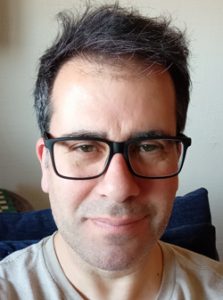
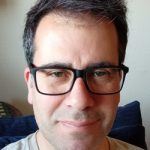
Nuno Reis Conceição
CQE, IST, Lisboa
Poster Session | P12
Nuno Reis Conceição completed his PhD in Chemistry in 2024 at Instituto Superior Técnico (IST) of the Universidade de Lisboa (ULisboa). Got his MSc Degree in Chemistry in 2019 also at IST and graduated in Chemistry at Faculdade de Ciências (ULisboa) back in 2001. Was the first S&T Manager of the Colégio de Química da Universidade de Lisboa (2017-2019). Between 2006 and 2017 worked in several private and public institutions (in areas not related with Chemistry). Currently develops research work at Centro de Química Estrutural (CQE) – Institute of Molecular Sciences (IMS) in the field of coordination chemistry and transition-metal catalysis (homogeneous or supported), focusing in Green Chemistry approaches, being the Deputy Coordinator of the Coordination Chemistry and Catalysis Group/Laboratory since 2020. Published 9 articles in peer-reviewed journals and 1 book chapter, and was involved in the organization of 9 scientific events held in Portugal.


Mariana Peixoto
AlmaScience Colab Madan Parque
Poster Session | P15
Mariana Peixoto is a researcher at AlmaScience, a collaborative innovation R&D lab dedicated to sustainable functional materials and green electronics and her primary focus is on developing smart materials. Currently, she is dedicated to PaperWeight AI, the world’s first paper-based pressure sensor, which integrates cellulose-based electronics with low-waste printing to create novel, responsive smart surfaces.
She graduated with a Master’s degree in Micro and Nanotechnologies Engineering from NOVA School of Science and Technology (FCT NOVA). For her MSc dissertation, she focused on the encapsulation of printed and flexible electronics, where she developed pressure and thermoelectric sensors using sustainable materials for encapsulation.


Tomás Pinheiro
NOVA FCT, Portugal
Poster Session | P16
Tomás Pinheiro received his integrated master’s degree in Biomedical Engineering from Nova School of Science and Technology in 2018, with his master thesis developed at i3N|CENIMAT in the area of paper microfluidics and gold nanoparticles applied for plasmonic, colorimetric transduction targeting the development of new diagnostic tools for relevant health markers. Currently, he is a PhD student in the Nanotechnology and Nanoscience program, aiming at the study and application of Laser-induced Graphene for the development of electrochemical biosensors and their translation towards wearable biosensing systems for sweat biochemical monitorization. The main topics of his research consist of the study of laser-induced graphene in sustainable substrates, such as paper, as its application for the development of versatile electrochemical biosensors able to be applied into biosensing systems for diabetes management.

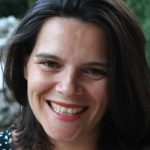
Ana Almeida
NOVA FCT, Portugal
Poster Session | P17
Ana Almeida has a PhD in Materials Science and Engineering (2021) , MSc in Biotechnology (2009) and BSc in Applied Chemistry (2007) from NOVA FCT. Published 14 articles in high impact factor peer-reviewed journals and 1 section of book. Has received 4 awards and/or honors. Participated as PhD Student Fellow in 2 projects, as Research Fellow in 5 projects and Researcher in 1 project. Recently she was awarded a research grant – Project ref. 2022.01619.PTDC – DynaCellCollect: Dynamically responsive micro/nano helical shaped membranes for water droplet collection to pursue her line of research as a PI. She is also a Work Group leader, Management Committee and Core Group member in the COST Action CA 21159 – PhoBioS. Currently she is a Junior researcher (CEEC) in the LAQV-Requimte in the Chemistry Department, NOVA School of Science & Technology and member of CENIMAT|i3N. Her research focuses on the development and application of biomimetic materials, with a particular emphasis on membranes, fiber-based materials, and responsive systems. She is dedicated to designing and producing advanced biomaterials for use in technological and medical fields, using sustainable materials inspired by nature’s sophisticated designs and mechanisms.
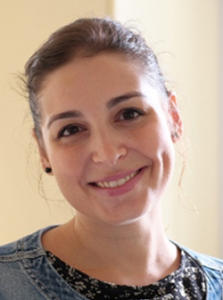

Diana Gaspar
NOVA FCT, Portugal
Poster Session | P18
Diana Gaspar is a Senior Researcher at AlmaScience on electronics and photonics on nature-based substrates. She has a PhD in Advanced Materials and Processing; whose topic was cellulose-based substrates for applications in electronic devices. She was a researcher in the CENIMAT/i3N and CEMOP, developing her work on oxide materials and paper electronics being involved in activities related to the production of paper transistors and electronic circuitry on paper. Her current interests are cellulose nanocrystals and their application in dynamic natural, nature-based materials for sustainable electronics and energy storage applications. She is the PI and co-PI of projects funded by the Portuguese Science and Technology Foundation, WP and task leader of several European projects.


Anitta Mathew
NOVA FCT, Portugal
Poster Session | P19
My name is Anitta Mathew, And I’m currently working as a research fellow at Nova School of Science and Technology (FCT, Nova), Portugal, Under the BRIGHT project. I have completed my masters in chemistry from Mahatma Gandhi University, Kerala, India. The BRIGHT project involves collaboration with European Research Institutions, including CENIMAT|i3N , Alma Science, Portugal and IKTS Fraunhofer (Germany). Our research focuses on 3D- printed cellulose Bio-foams targeting energy harvesting and sensing application. These systems can be directly integrated into clothing, sports and transportation systems to create energy from wasted mechanical energy and sense motion. I’m writing this mail to show my interest in presenting my research finding “CELLULOSE: THE SMART MATERIALS FOR GREEN ELECTRONICS” in the upcoming EurASc Symposium and ceremony, 2024. I have attached the Abstract for the presentation and my photo, along with this mail. I’m kindly looking forward to your valuable response.


Annalisa Bracco
i3N-CENIMAT, Materials Science Department, NOVA FCT, Portugal
Poster Session | P20
After completing the Bachelor’s degree in Materials Engineering at the Politecnico di Torino, I pursued an integrated Master’s degree in Materials Engineering at the NOVA FCT of Lisbon.
Currently, through a Fellowship supported by the Portuguese Science Foundation (FCT), I am working on the development of polymeric films with cholesteric liquid crystals microdroplets that could be used as deformation sensors for structural monitoring.
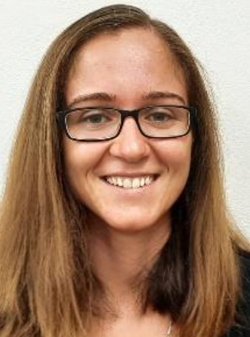

Maria Morais
i3N-CENIMAT, Materials Science Department, NOVA FCT, Portugal
Poster Session | P22
Maria Morais concluded a Master’s Degree in Biomedical Engineering from NOVA School of Science and Technology (NOVA-FCT) in 2021. She is currently a PhD student in Nanotechnologies and Nanosciences at NOVA-FCT. Her work focuses on developing printed devices, namely flexible pressure sensors based on oriented metal oxide nanostructures. Her research interests focus on the synthesis of metal oxide nanostructures and their incorporation in printable inks for the development of printed electronics platforms.


Marta Corvo
i3N-CENIMAT, Materials Science Department, NOVA FCT, Portugal
Poster Session | P23
Marta C. Corvo obtained her degree in Applied Chemistry and a PhD in Chemistry from NOVA University Lisbon, Portugal. She currently leads the Ion Gels team at the Instituto de Nanoestruturas Nanomodelação e Nanofabricação (i3N) at Cenimat, where she is a Principal Researcher in the Soft and Biofunctional Materials Group. Her research interests encompass ionic liquid and ion gel materials and NMR studies in solid-state and solution. She focuses on applications such as CO2 capture and conversion, art conservation, energy, and tissue engineering.


Jenny Boane
NOVA FCT, Portugal
Poster Session | P25
Jenny Boane is a PhD candidate at Nova University of Lisbon, focusing on her thesis titled “Colloidal Lithography for Light Trapping in Flexible Thin Film Solar Cells.” She holds a Master’s degree in Physics from the Federal University of Lavras in Brazil and a Bachelor’s degree in Educational Physics from Eduardo Mondlane University in Mozambique.

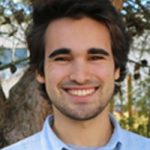
Guilherme Ferreira
NOVA FCT, Portugal
Poster Session | P26
Guilherme Ferreira graduated from Nova University of Lisbon with a master’s degree in Micro and Nanotechnology Engineering in 2019. Currently he is a PhD student in a doctoral program of Nanotechnology and Nanoscience. In 2019 and 2020 he was working for as a research fellow at CENIMAT /i3N in Almada, Portugal. His research interests include polymer chemistry, materials for sensing and energy harvesting application, energy harvesting electronics and cellulose based smart applications. His work has been published in several high impact journals including: Nanoenergy; Advanced Functional Materials and Chemical Engineering Journal. These works have been presented both orally and in poster format in several national and international conferences, having won a best accepted speaker award at InnoLAE 2023.
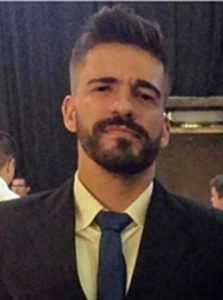

Rafael R. Assis Silva
i3N-CENIMAT, Materials Science Department, NOVA FCT, Portugal
Poster Session | P27
PhD candidate in Micro and Nano technologies at New University of Lisbon (i3N-CENIMAT) under the supervision of Prof. Dr. Rodrigo martins and PhD candidate in Materials Science and Engineering at Federal University of São Carlos (UFSCar-Brazil) under the supervision of Prof. Dr. Caio Gomide Otoni. My expertise lies in materials characterization, with a particular focus on mechanical characterization, chemistry (FTIR, Raman, and XRD), and optical characterization for colorimetric sensors.
In 2022, I completed an internship abroad at the Tyndall National Institute in Cork, Ireland, under the guidance of Dr. Daniela Iacopino. Presently, I am engaged in my doctoral research in New University of Lisbon. My research focuses on comprehending energy generation at the liquid/solid interface, coupled with the advancement of energy generators. This includes a focus on triboelectric and piezoelectric nanogenerators, aimed at mitigating environmental impact and fostering the development of self-powered sensors.
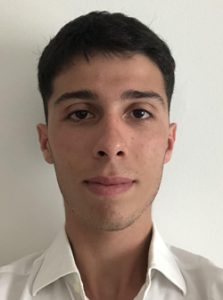
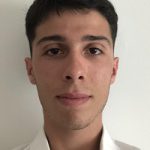
David Carvalho
i3N-CENIMAT, Materials Science Department, NOVA FCT, Portugal
Poster Session | P28
David Carvalho is a research fellow in the Flexible and Sustainable Electronics group at CENIMAT|i3N. He completed his master’s degree in Nanotechnologies and Nanosciences at NOVA University Lisbon in 2023.
Immediately after finishing his master’s, he began his first research grant in an international project named SUPERIOT. More recently he was also included in the Gambit project. During his thesis work, he fabricated and characterized UV sensors based on zinc oxide nanostructures using solution-based techniques. This work was presented at the RSC Chemical Nanoscience and Nanotechnology Early Career Researcher Virtual Poster Meeting, where he won the award for best poster in the techniques category. Continuing the trajectory established during his master’s thesis, he is currently focusing on sustainable materials and printing technologies such as spray-coating, screen printing, and drop-casting. His current research involves the production and characterization of conductive inks, particularly graphene and MXene-based, deposited via various printing techniques. He explores different designs and substrates, including flexible ones, aiming to develop various electronic devices such as UV sensors, micro supercapacitors, diodes, antennas, etc. His ongoing research also includes the synthesis and characterization of solution-based zinc oxide nanostructures with different morphologies. In addition, he has also gained experience in cleanroom operations, particularly in conventional lithography processes. As a research fellow, he participated in the innoLAE 2024 conference in Cambridge in February 2023, where he also presented a poster. Although still early in his career, he aims for much more in the future.

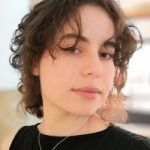
Mónica Dyreby
i3N-CENIMAT, Materials Science Department, NOVA FCT, Portugal
Poster Session | P29
Mónica Dyreby is a Master of Physics Engineering graduate from the NOVA School of Science and Technology. Her master’s thesis at IMSEAM, on organic semiconductors (PM6:Y6), combined experimental and simulation work and culminated in a co-authored presentation for the 2024 MRS Spring Meeting. Currently working as a Research Fellow at CENIMAT|i3N, Mónica conducts opto-electronic simulations to optimize Tandem Perovskite/Silicon solar cells.


Edgar Coimbra
NOVA FCT, Portugal
Poster Session | P30
Graduated from NOVA School of Science and Technology in December 2023 with an Integrated Master’s degree in Materials Engineering. Currently taking part in a research fellowship in the scope of the Paperovskite project and applying for a PhD with the goal of designing high-performance transparent conductive electrodes for use in bifacial solar cells via advanced nanofabrication techniques. Primary research interests are in sputter-deposition of metal oxides for photovoltaic applications, interface engineering of perovskite solar cells, and advanced fabrication of transparent conductive electrodes.


Douglas Vieira
NOVA FCT, Portugal
Poster Session | P31
Douglas Henrique Vieira holds a Physics degree from São Paulo State University (UNESP), Presidente Prudente, Brazil (2017), and a Master’s in Material Science & Technology from the same institution (2020), with a research exchange at Bangor University in 2019. He is currently pursuing a Ph.D. at UNESP, working at the Laboratory of Organic Devices and Sensors, and is on a research exchange at CENIMAT, Universidade Nova de Lisboa (2024). His research interests focus on printed electronics, field-effect transistors, and their applications.


